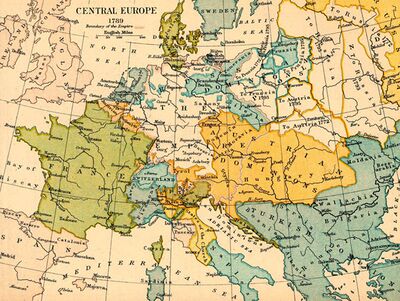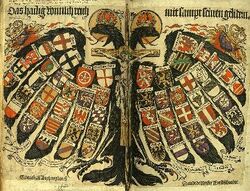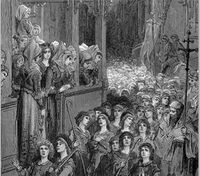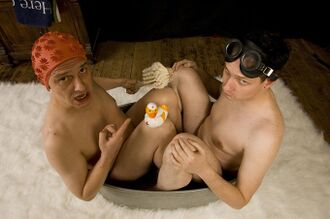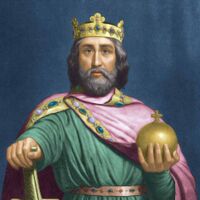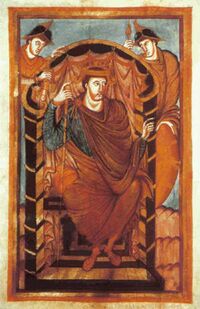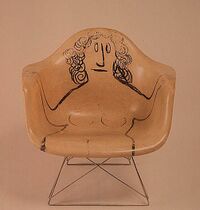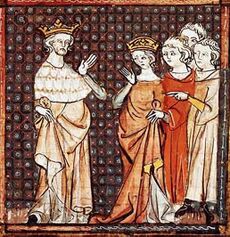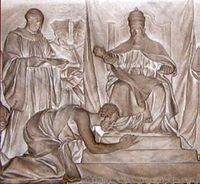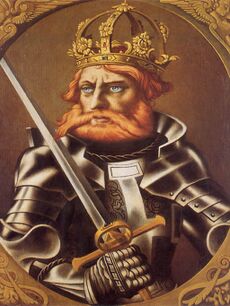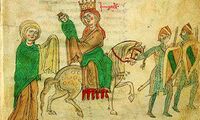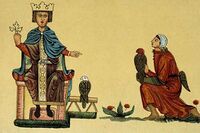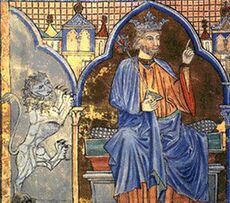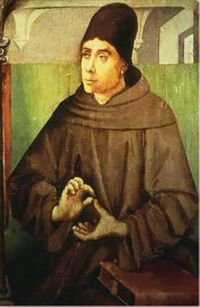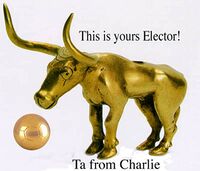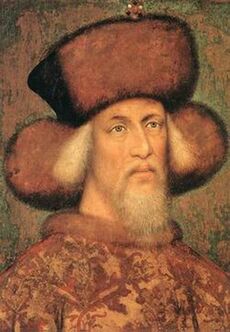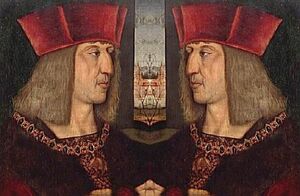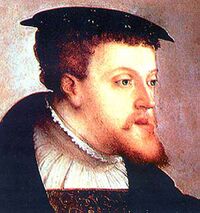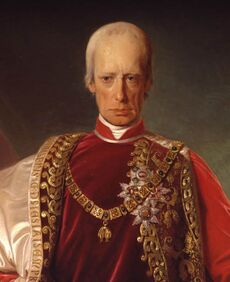Holy Roman Empire
“Oi! That's our intellectual property!”
“An unholy mess. I'll fix it.”
If you had looked at a map of Europe in around 1789 you would see some familiar countries and a few ones you perhaps had never heard of. So in the West there was Great Britain and Ireland (coloured pink of course for obvious reasons (Le Vice Anglais), France, Spain, Portugal and in the East there was Poland and Russia with odd looking borders. But in the middle? Well there was Italy but with some territories marked 'Papal States' and 'The Kingdom of the Two Sicilies (cartographical double vision?) and off shore, an unimportant island marked Corsica. But what is that mess lying in the middle where Germany, Austria, Switzerland and the Benelux [1] countries now sit. You will read Holy Roman Empire. What the Caesar?
Neither This, That or The Other
So you thought the Roman Empire died back centuries ago when Attila the Hun was running amok, the Goths were moving around like a bunch of lost fashion victims and the Vandals were..well Vandalizing? We'll you're wrong. The 'Holy Roman Empire' claimed it was the legal heir to Ancient Rome, the imperium of the mad emperors in the style of Caligula, the introspective couch thinker Marcus Aurelius or the Christianising Constantine the Great. The short answer is yes but how that empire became one located in Germany does need to be retold in these new barbaric times.
Well let's take the name apart first. 'Holy'? Didn't all monarchs claim they got their powers from God?? Yes but here the 'Holy' bit comes with the extra bonus that this 'Holy' realm has been especially blessed by the Pope with a coronation in Rome (malarial fever permitting). It was a title that was theoretically open for anyone to apply, but as long as they were a 'straight' Catholic and defended the church from all enemies. However, over the centuries these job requirements had been effectively narrowed to one family, the Habsburgs. They had also by then dispensed with the Pope bit, proclaiming that they were 'elected' emperors and not 'selected' by the Catholic church. Not that the elections for emperor were that exciting, besides only having one family to chose from (except for one brief administrative error when someone else got in), the electorate was just seven men. It later went up to eight and then nine but at this rate, the population's chance of voting for their emperor would have been waiting when the Sun exploded.
So if the Holy Roman Empire wasn't 'Holy' anymore, where was Rome in this set up? Well as outlined earlier, emperors had been required to go to Rome to receive their imperial upgrade[2]. This however became more and more difficult as the Italians made it expensive and dangerous to drive down their roads to the eternal city. So emperors preferred to stay at home. These faux imperialists would claim to be 'emperor' when in reality they were only just a puffed up archduke. The other European monarchs accepted their central European neighbour as 'Emperor' if he wanted to be called that. It wasn't worth going to war for.
Now we come to the 'Empire' bit. The French writer Voltaire who first made this analysis said that bit was the most farcical element. It didn't even have a proper border with some states like Prussia and Austria crossing both sides of the border but other bits like Hanover being in part of the British Empire. Then there was Belgium then known as the 'Austrian Netherlands' — in comparison to the Dutch-Netherlands and Denmark holding on to Schleswig-Holstein. The rest were a patchwork of various micro states or 'Free Cities', independent bishoprics. Some looked more compact like Bavaria or Saxony but all were in a flux of petty bickering and occasional wars. The Emperor was the top political banana with special status in this fruit salad but he had no powers to tax anyone, impose central authority or even persuade anyone to defend the empire's borders. It was a mess and by 1789 looked like a house about to fall down but how did Germany end up like this?
Old Rome and Byzantium
So to understand how this all arose, it is a step back to what happened when the Roman Empire fell in the 5th century. Except that bit is a lie. The Roman Empire didn't fall, it sort of re-located East. Well ok that bit in the west was abandoned or lost. The British were definitely abandoned by the Romans for a lot of good reasons (Britannia was just a bit too far away and ill mannered) and the Franks, Goths and Vandals took the rest. So for the emperors now residing in Constantinople, the Roman Empire was still there, if just missing a few rooms which they hoped to reclaim and redecorate at a later date.
One Constantinople based emperor Justinian did try and do just that. He ended the Vandals and made them to clean up their mess and took Italy back from the Goths (the Ostrogoth half of the tribe). He even snaffled a bit of Spain from the Visigoths but the Franks in Gaul were not touched. Unlike the other German tribes who had either been converted to the 'wrong' type of Christianity (known as Arian) or others who preferred to worship trees on Wednesday, the Franks had already joined the Catholic church via Clovis getting his baptismal dunking a few decades before. Justinian eventually ran out of soldiers and money but he had at least got Rome back and so that appeared to make the Eastern or Byzantine Empire the legitimate owner of all that city's old imperial rights and claims. They were extensive.
Though the Papacy was back inside the 'Roman Empire', the Popes now found that they had plenty to argue with Constantinople. The Byzantines treated Italy as a minor possession full of ungrateful (and broke) Italians. Therefore they regarded all complaints from Rome about their failure to protect them from the Lombards or other marauders as a lot of Latin whinge. Then the Byzantines started to redefine what they thought Christianity should be. As the descendants of the Greek thinkers, the Byzantines loved a good theological wrangle which left the Latin speaking Romans totally out of the loop. Eventually the split came when Leo the Iconoclast banned all represential art of Jesus and started deleting unwanted religious symbols off his screen. The Papacy objected but Leo's son Constantine V took it further by smashing up all their extensive collection of relics. This made a break more certain. The obvious answer to the Papacy was not that having emperors wasn't a good thing but that those who called themselves in Constantinople as such were not real Christians at all but deviants. Clearly, a vacancy was emerging.
Charlemagne
The Frankish king Charles as was then called looked to the Papacy an excellent imperial candidate. He was a mighty warrior, a strong catholic who had recently spent many years killing Saxons in northern Germany for being unreconstructed pagans. Charles rough conversion methods (confess or die) seemed to be just the man. There was one problem. He didn't want it, couldn't see the value of it and didn't want the Byzantines getting all upset with this idea by funding rebellions and treachery to undermine his kingdom.
The papacy had possibly hoped they could appeal to Charles's hostility to unorthodox theological thinking by opposing the iconoclastic regime in Constantinople. But that had changed in the 780s when the screen breakers were ousted by the widowed Empress Irene on behalf of her son Constantine VI. East and West Christendom now appeared to be chanting from the same hymn sheet.
However this was changed in 797 when in a dispute about not cleaning his room, a frustrated Irene had her son blinded, deposed and locked up to prevent him from tripping over the expensive furniture in her palace. Irene remained empress and therefore the supreme ruler of the Byzantine Empire and heir to the Caesars. To the Papacy having a politically on top was even worse than having an statue basher as emperor. A man was called for and by chance, the one Pope Leo III wanted was visiting Rome for his Christmas dinner.
King Charles and his Franks arrived and took all what was left of Rome's best hotels to stay in for their customary carousing. It must have been a good party on the night before because the next day, Charles was mumbling about something as he prayed at the tomb of St.Peter inside the main church when he felt a fat man trying to squeeze a tiny crown on his head. Before Charles could do anything, Pope Leo III said:-
Arise Charles, you are him no longer. Your name is Charlemagne Augustus, Roman Emperor. Do you want any doggy bags?. Popes 1 Holy Roman Emperors 1
The First European Union
Charlemagne was the first president of this 'restored empire' or European Union. The member states were the West Franks (France), the East Franks (Germans), Odds, Sods and Saxons (More Germans,), the Spanish March (a recent conquest from the Moors on the other side of the Pyrenees), the former Kingdom of the Lombards and the Papal States with the underpopulated and ruined Rome as the official capital. Since Charlemagne had inherited or conquered all of them, decision making was very brief then but he couldn't write down the conclusions so would start arguing with himself again.
Where the Pope fitted in this political arrangement was not quite evident. Charlemagne certainly didn't want to stay in Rome as the place was a tumbledown ruin in places and had no decent water supply besides the muddy puddled Tiber. So like a couple hitched together but impossible to live with, Charlemagne stayed in the north in his new capital of Aachen whilst the pope in the south, their communications via a few random notes and scribbles. There was a half arsed plan to marry Irene in Constantinople but she rejected her co-emperor as a shit-covered barbarian. So no dice there.
Charlemagne's plan for his own empire was to split it amongst his sons as he couldn't afford to buy them all Ferraris but they all died before him except Louis and a grandson called Bernard. The new emperor, crowned with the name 'Ludivicus' is better known as Louis the Pious (by the church) or Louis the Debonaire (by the ladies) or Louis the Fair because he didn't cheat at cards. Yet barely had he buried his father when his own sons asked what would happen to them when he died. As there were other relatives keen to take their own personal chunk off Charlemagne's empire, Louis took the drastic act of locking up his sisters in nunneries (no bothersome inlaws) and enforcing monk hair cuts to male cousins to make them illegible for the role of emperor. For Bernard, Louis gave him the eye gouge treatment since this was how he understood emperors dealt with dangerous enemies. Though his nephew was offered designer dark glasses to cover his sightless sockets, the young man died. The church said Louis was behaving like one of the old pagan emperors so Louis was obliged to abase himself in front a committee of monks. The church quite liked doing this and would demand of others they chose to humiliate. Popes 2 Holy Roman Emperors 0
East, West, Transgender...
Louis died in 840 but no one came to his funeral. His eldest son Lucious Lothar (or Lothar Matthaus in German) had hoped to get the lot when his father was buried. However his two younger brothers, the shaven headed Charles Le Metro-Rugeux Homme[3] and Louis Der Bratwurst disagreed with the idea and marshalled their armies to meet up in a three way battle. After thousands had been killed and had their guts pulled out, the brothers decided that perhaps it would have been better to talk. Charles took the Western bit which he called West Frankieland (France), Louis the Bratwurst claimed the eastern lands as East Frankieland (Germany), leaving Lothar with just the filling, the Emperor of the Squeezed Middle Frankies and also emperor. Lothar's territory stretched from the red light district of Amsterdam to the foetid swamps of Rome. It was known as the Transgender Empire but others called it 'Lorriane' in his memory but it ended getting invaded and partitioned so many times that it ended up the size of a fetish nightclub in Strasburg (today the site of the European Parliament).
Lothar's son Louis II succeeded him. His imperial rule was restricted to Northern Italy and Rome. When Louis died in 875 AD, his skinhead French uncle Charles Le Metro-Rugeux Homme took advantage and got himself crowned emperor. But Charles was soon dead and the papacy had no candidate to give it until an obese member of Charlemagne's family found it whilst hunting for food. Known to history (and restaurants) as Charles the Fat, the porky one was eventually ejected from Rome for drinking all the communion wine in 888 AD.
The popes will still keen to have an emperor-defender but it had become a job with few fringe benefits. For the next thirty years popes crowned a variety of Italian, French and German candidates as emperor. Sometimes different popes crowned rival candidates so that when an emperor was chased out of Rome, so very often was the pope that had just proclaimed them. One imperial contender Louis III from Provence got the imperial crown but on a subsequent return trip was captured and had his eyes torn out by a rival. There was also no point looking to the Papacy for help about choosing an emperor. From 888 to 936 there was a succession of popes using the office to indulge in orgies, digging up dead predecessors to condemn in person at synods or throw others in prison where they would be murdered[4]. Well so much for the 'restored empire', when the last of these mini-emperors Berengar was cut down by one of his own soldiers in 925, no one else came forward or allowed themselves to be crowned. It seemed the end of the 'Holy Roman Empire'. The Byzantines looked on with what ever the Greek for Schadenfreude is (free retsina?). Popes 0 Holy Roman Emperors 0
Lost and Found
If the reality of becoming a Holy Roman Emperor had descended into farce, it is hard to understand why anyone would want it. The obvious answer is prestige, given that the title involved a papal coronation and tons of Roman swag. It also meant you'd rank higher than a king, not a small thing in a society where status and position were all that counted. The bigger the title, the greater the codpiece.
Discounting the Italian candidates, the only possible places to find a new 'emperor' would be France or Germany. France would seem to be the logical source of new emperors as Charlemagne's dynasty was still ruling there, but with kings like Charles the Simple, Louis Never-At-Home and Lothar the Terminally Depressed – You Don't Even Know, they didn't inspire much confidence.
Now have you ever wondered why the name 'Otto' is so popular in Germany? It stems from Otto the Great who became King of Germany in 935. He was the son of previous king Henry the Fouler, a name that king acquired for his love of groin grappling in football matches. In Germany Charlemagne's dynasty had ended with the death of Louis the German's great grandson Louis the Script Kiddie in 911. The Germans had then elected Conrad I and then Otto's crotch kicking father Henry as their monarchs. They had spent a lot of time fighting the 'Huns' (the Magyars) and at the same time, expanding eastwards against the still heathen Slavs. No time to play at being emperors.
Otto's reputation was assured when he broke the Magyars at Lechfield 955[5] and pushed them out of Germany[6]. He couldn't read or write but like any nouveau riche prince Otto wanted to show he was much more 'worth it' then the French and Anglo-Saxons. He was going to become an emperor!
The German army invaded Italy and made their way down to Rome. The resident Pope at the time was John XII, a man who took his 'spiritual' duties so seriously that even the papal brothel was regularly blessed. Surprised to see Otto, John agreed to crown him emperor and declare the 'Holy Roman Empire' was back in business. Popes 1 Holy Roman Emperors 3.
Reboot and Expansion
The rebooted Holy Roman Empire didn't include France since as they couldn't lead it, the French kings preferred to stay in Paris and brood. Otto's empire was Germany and the top half of the Italian boot. He wanted the Byzantines to recognise his new title too and requested to send over a delegation to Constantinople to ask for an imperial princess. They re-directed the envoys to a large pit with spikes.
Otto returned to Germany to check on his house contents[7] but promised the pope he would be back. As John didn't like sharing Rome with his 'colleague', he stirred up trouble for Otto by sending out letters mocking the emperor's ignorance. In retaliation Otto had John deposed for 'heresy and harlotry' and ensured a friendlier pope. John tried to make a come back but died 'in the Acts of Adultery,' evidently different from the Acts of the Apostles.
Undaunted by the previous failure, Otto repeated his marriage request to Constantinople.Though the Byzantines still thought these new emperors were impostors[8] they agreed to a new diplomatic mission. However it was too good a chance to fool the German suitors. The Byzantines offered up a princess called Theophano who they implied was a member of the imperial ruling family. She wasn't but Otto's envoys were too dim to realise. The Greeks laughed themselves silly once their unwanted visitors left.
Otto's son Otto II became King of Germany and Holy Roman Emperor. If his Greek speaking wife wasn't really a princess as originally advertised, in levels of sophistication she made everyone around her appear as peasants, including her husband. Otto II tried to expand the Holy Roman Empire southwards from Rome where control was disputed between Lombards, Italians, Greeks and Saracens. But like his father, Otto needed to travel back to Germany. Once again trouble in Rome brought him back. The Papacy was keeping up with its recent track record of popes dying in bloody feuds. The Emperor tried to sort matters out by inviting the local leaders to a banquet where he had them all killed. Imperial hosted dinner parties lost a lot of their popularity as a result. However a few years later Otto died suddenly in Rome. Perhaps he hadn't got them all!
The new King of Germany Otto III was barely three when he was crowned. Fluent in baby talk, Otto planned to make Rome the capital of his empire once he learned how to walk. The only problem was that the papacy was reluctant to co-habit but rival candidates for the job of pope were prepared to offer anything. Otto had a solution: He would make his cousin Bruno Lederhosen pope and did this in 996 who rewarded Otto with an imperial coronation. However Bruno (as Pope Gregory V) was too weird for the local Romans and his camp, leather wearing behavior offended the uptight Romans who expelled him and elected their own pope, Otto's former teacher as Pope John XVI.
Seeing himself as a visionary, a new Constantine even, Otto III lost his temper. He returned again and dealt with rebels. Their leaders were executed. Pope John XVI got the worst of it. He had his eyes burnt out, tongue cut out, ears lopped off and his hands broken. Otto said he spared John's life because he 'hadn't been a bad tutor'. A short time later Bruno/Gregory V died ( a mysterious cat walk accident) so Otto got an old tutor of his father elected pope as Sylvester II.
In 1000, Otto and friends went to Aachen to see Charlemagne. They broke open the tomb and found the emperor bolted to one his old chairs. Otto then checked to see if there was any gold or loose change to make off before closing it again. Otto was still young, perhaps he saw this as a prank. Not long after he decided he should get married and asked for a Byzantine princess. Aware they couldn't pull off the same trick twice, the Greeks agreed and sent Princess Zoe whose father and uncle Constantine VIII and Basil II were co-emperors. She arrived in Italy, with her wedding presents and chests of money. However at customs Zoe was told Otto had died and quickly re-embarked with everything and returned to Constantinople. Otto was reported had been poisoned by a jealous mistress. Popes 2 Holy Roman Emperors 8.
Entitlement
Otto's eventual successor after a scuffle and knife fight amongst rivals was his cousin Henry II. Known originally as 'Henry the Quarreler' (a drama king), he would after death become 'St.Henry'. This title was earned when Henry and wife Cunigunde agreed to a 'hands off' marriage and slept in separate bedrooms. Besides becoming King of Germany, Henry was also 'King of the Romans', a title that meant he was able to run the Holy Roman Empire if unable to travel to Rome to receive the imperial crown.
There was nothing very saintly about Henry's career. The Poles and Czechs were on the receiving end of his broadsword and Henry killed a lot of catholic Italians when they didn't like him trying to cross their lands on his way to Rome with an army of looters.
When Henry died (clueless and heirless), his fellow German princes extracted a long list of demands for the next ruler Conrad II, Count of Worms[9] to sign. A couple of years later Conrad was in Rome for his enthronement as emperor and a few years, received the Kingdom of Burgundy from its last king. So within a short time Conrad's full list of titles were 'Holy Roman Emperor, King of Germany, King of Italy, King of Burgundy. Just as well he wasn't expected to wear all his crowns at the same time.
Conrad's successor was his son Henry III. Surnamed 'the black' for liking of smelly leather trousers, the Holy Roman Empire was now a vast realm to check on. Everyone wanted to be his friend and ask for loads of favours. This included messages from Rome where the popes were once again fighting each other and trying to flatten rivals with a good right (bishop's) crook.
Feeling he had to do something, Henry travelled to Rome and deposed three rival popes. So far had the prestige of the papacy had fallen that no one saw this as strange. Henry 'elected' his own candidate as pope and left Rome with the imperial title. The Holy Roman Empire looked strong and Henry was young but all his business jaunts on dirt track roads had worn him and he died in 1056. Popes 0 Holy Roman Emperors 7.
On Your Knees
In life as politics there is no sense of gratitude. The new Holy Roman ruler was Henry III's son Henry IV. He was only six years old which in any monarchy meant plenty of self helping by the aristocracy to the treasury. Henry would have expected that, all European monarchies were at their most vulnerable when a ruler was still in their romper suit.
However the biggest source of Henry's problem was to be the church. As related elsewhere here, the Papacy had since the time of Leo III had been largely run as a criminal enterprise for who ever got elected. A few years earlier one family had managed to get three of their own family members 'elected' pope in succession as if sanctity was hereditary. Henry's father had stopped that and tried to ensure that future popes would at least show some hints of understanding what being the Vicar of Christ entailed.
So with that history, Henry IV reasoned he would be a better judge in selecting bishops. He was however challenged by Pope Gregory VII who said that was his job description and denied that any secular ruler could do this (ignoring precedent). Anyone would disagreed with that would be excommunicated. There then followed synod where Gregory VII had this confirmed, the idea that the Pope and Emperor were equals (if in different spiritual/temporal spheres) was changed. Since God was more powerful than any army or monarch, the pope would have the last word. Gregory excommunicated Henry. It was the equivalent of a Papal Nuclear Weapon.
Now you may think not be allowed to take communion or nibble on a wafer was no big deal but it meant Henry was outside the church and therefore no one owed him a dime. It was like having your credit cards cut up. To get his 'rating' restored, Henry had to find the Pope but Gregory was playing hard to get. He had left Rome for a winter holiday break in Canossa, a three star castle in Lombardy. Henry turned up but wasn't allowed in. For three days he stood in snow, building obscene ice sculptures and asking Gregory to cancel his order. It was only when Henry dressed like a barefoot beggar that he was finally allowed in, 'walking' all the way on his knees to where the pope sat in his snow mobile. In true christian fashion, Gregory drove a hard bargain. He would lift the excommunication if in return Henry acknowledged that papal supremacy as outlined in a document known as the Donation of Constantine. This was a document that alleged Emperor Constantine had handed over Rome and the empire in the west to the pope in exchange for a cure for leprosy and bringing him to Christianity. It was a forgery but as the church controlled access to all the relevant documents, it was taken to be true. Henry signed his agreement in exchange for a cup of hot soup.
Once he was out of Canossa, Henry repudiated everything he had signed as he 'was freezing his bollocks off and would sign anything to stay alive'. There then followed a long war between Henry and Gregory which saw each side acknowledge rival popes and kings. Henry was crowned emperor by his own 'antipope' whilst Gregory encouraged the German princes and clergy to elect a different king.
Others got involved in the confusion including the Byzantines and a new force in Italy, the Normans who conquering southern Italy and Sicily for themselves. Henry got another excommunication and eventually forced to abdicate by his son Henry Junior. But the Papacy liked to remind everyone that Henry had acknowledged to Gregory he was an 'imperial shit' and the verdict remained once everything else was forgotten. Popes 6 Holy Roman Emperors 3.
Crusade!
Henry's son Henry V (Henry the Limp) promptly 'changed sides' after becoming King and carried on his father's dispute but without any change of fortune. More excommunications, fights at an imperial coronation and rival popes popping up everywhere again, it was time to call a truce. Henry agreed to drop the original cause of the dispute and allow the papacy appoint their own candidates to ecclesiastical benefices/'goodies'.
Henry had nominated his nephew Frederick Hohenstaufen, Duke of Swabia as the best candidate as next Holy Roman Empire ruler but the German nobles had enjoyed their gain in power with the recent reigns and so chose someone else. This was Lothar III of Supplingburg, ancient by medieval standards at the ripe old age of 50. Frederick refused to accept the result and went to war against Lothar. Joined by his brother Conrad, the Hohenstaufen brothers hoped to give Lothar a good 'Hohenstuffin' but they lost support and were forced to submit to Lothar. The papacy didn't intervene either as Lothar was considered a loyal supporter of Rome (a.k.a a pliant patsy).
Following Lothar's death in Italy (sucking more Papal toes, this time voluntarily) there was again a dispute about the next King. This time Frederick supported his brother Conrad III for King of Germany/King of the Romans etc etc. Lothar's son-in-law Henry Welf aka Henry the Proud, Duke of Bavaria and Duke of Saxony was the most powerful candidate but lost the vote and presumably, the argument. Now it was the Welfs turn to act the rebels and there was another round of battles, sieges, treachery and general bad faith.
In amongst all this, the message came through that the Crusader States in the East were under dire threat again. Seeing this as a way of turning internal German aggression to alleged foes outside, Conrad signed up to co-lead the Second Crusade with the French King Louis VII. This expedition also meant postponing the trip to Rome to become Emperor.
This Franco-German alliance was full of great promises. The French went by ship whereas the Germans chose to go by road. This involved marching through Eastern Europe and all the way down to Constantinople. As with a lot of previous and future crusaders, those who took the cross believed they had carte blanche to kill or maim anyone en-route. Conrad's army kept to that tradition. On arrival in Constantinople (or rather outside the walls), the Byzantine Emperor Manuel I quickly shipped his unwanted 'guests' across the Bosphorus and pointed in the direction of the nearest Turkish army. The German crusaders were mangled, only those on a horse got away.
By the time the French fleet arrived, Conrad's army had dwindled to the hundreds. Not wishing to waste anymore time fighting the wrong enemy in the wrong place, the crusaders made it to the Holy Land. More arguments between the allies and the Second Crusade was declared an embarrassing failure. Conrad died not long after, still uncrowned as emperor. Popes 2 Holy Roman Emperors 1.
Fred the Red
He could have been known as Red Beard (English), Rote Barbe (German), κόκκινο κώλο (Byzantine Greek), Barbara (French) but it was the Italians who called him Frederick Barbarossa . It wasn't meant as a compliment, though like their Anglo-Saxon cousins, the Germans were prone to go red in the face with embarrassment or drink but it was the name that eventually stuck.
Such is the legacy of this name and reputation, today doctors describe unsuccessful invasive surgery, as an Operation Barbarossa. This medical joke may owe its current currency to Adolf Hitler but it can be argued that Barbarossa's own ambitions were to come to nothing in the end. Except Barbarossa didn't die in a bunker but drowned in a river when he forgot to take his armour off for a wash and fell in.
Frederick I was elected King of the Romans and Germany in 1152, crowned King of Italy in 1155 and then Holy Roman Emperor in 1155, a rapid succession of coronation parties. By Holy Roman standards that was indeed extremely rapido! Indeed it was Frederick who adopted the title Holy Roman Emperor as his full title when issue decrees to execute/banish enemies. He wanted to return the Empire back to it's strength 100 years before and would treat everyone in Europe as a social lightweight with the single exception of Henry II of England. The two men recognised each other as if in a mirror, surrounded by enemies yapping enemies and both having problems with the tax-exempt church.
Perhaps because he liked the climate, Frederick spent years in Italy. Perhaps he wanted them to be more like Germans but the Italians in the north were less keen on his presence. They formed the Lombard League, the first version of Serie A football competition. When the Germans demanded the go back to being peasants and supplying the Holy Roman Empire with soldiers and fodder, the League rebelled. Playing under the Papal colours, Milan threw out their garrison and declared themselves as 'winners'. However a few months later, the Germans were back and Frederick demolished the city and hung his dead opponents upside down in a coaching inn.
But the 'Lombards' were soon back, burning and destroying all German-badged vehicles. Pope Alexander III said they would all to heaven if they gave Frederick a beating — administered in 1176 at the Battle of Brassiere. Frederick left Italy and went back to Germany in a red faced sulk. Frederick had to blame someone so he took out his anger on Henry the Lion, Duke of Saxony and Bavaria who had been acting as Barbarossa's local enforcer. Accusing Henry of plots and ass kissing the Papacy behind his back, Henry was stripped of all his lands and ran off to England. Henry the Lion was now Henry the Pussycat.
This bit of blatant thuggery by Frederick got him noticed by King William II of Sicily. The Norman monarch was unhappy to see the Papacy look strong and suggested a marital link between their two families. However the slippery Sicilian sent his aunt Constance, a woman reputed to be too ugly even for the nuns and had been left chained to a shelf in William's wine cellar. Frederick took Constance in, she wasn't for him but his eldest son Henry.
In the meantime, out in the Holy Land Saladin had taken Jerusalem without the statutory massacre that usually accompanied such deeds. The Christian leaders were appalled and pledged to 'save Christendom' from the infidel. Richard the Lionheart, King of England and Philip 'August Monthly Holiday' , King of France took the cross and solemnly swore to meet each other by the hotel swimming pool in the city of Acre with their respective armies.
Barbarossa, for so long the enemy of the popes also agreed to go. Since he had been there before, he at least knew his way to Constantinople. Once again the Byzantines shut up the shops and closed the gates, their Emperor Isaac II sending a message that read in translation To Frederick Barbarossa, Chief Thug of Germany. Barbarossa threatened that anymore of that and he would be happy to destroy the city. Finally Isaac sent an apology to 'my brother emperor' and gave the German crusaders a road map to follow. This time the German army got almost to Syria until Barbarossa's bizarre swimming accident. Perhaps it was the heat that got to him and he was no longer a young man. Later legends were to suggest that Frederick had faked his death and returned to Germany to hide under a mountain. He would then return when Germany was in mortal danger but the old warrior missed his return date in 1945. Now Germans don't think he will be coming back.
Innocent Until Proven Very Guilty
Frederick's son Henry VI was very keen to get to Rome when news that his father was dead. Constance's uncle had also recently died but though she was the heir, the other Sicilians preferred to stick to Godfathers rather than Godmothers and had made Tancred their Bastard king.
Taking this insult personally, Henry headed south. He was crowned Holy Roman Emperor within a year but out there his imperial purse was lifted, leaving the emperor with a bag of bad cheques. Henry was thrown out of his hotel and headed back towards Germany. He then got the news that Duke Leopold of Austria had arrested Richard the Lionheart for raucous, English pub style behavior whilst crossing his territory. Leopold then sent a shackled Richard to Henry and suggested they take bids for Richard's release. Though the Papacy objected that Richard was still wearing his crusader suit when apprehended and therefore immune from kidnapping, Henry put the English monarch on Ransom Bay and asked for 150,000 Imperial Euros. Otherwise 'King Dicky' would be returning to London in bits.
The English tried to hold out, hoping for a currency devaluation but eventually paid up. Now flush with funds, Henry returned to Italy with his triple rated army and invaded the Kingdom of Sicily. Tancred the Bastard died of fright before Henry got to him so he took his imperial fury out on Tancred's son William. The young lad was blinded, castrated and thrown into prison to die. So Henry was obviously not joking about what he would have done with King Richard if the English hadn't settled their debts. Whilst in Sicily, Henry's wife Constance gave birth to a son. This surprised everyone as she was over 40 and hadn't seen likely of having any children. Just to show that cynicism is nothing new, so strong were the rumours that her son was an imposter, Constance was obliged to show off her hooters to the crowd and suckle her son in public. But Henry had a son and named him Frederick Roger Piss-on-the-Papacy Hohenstaufen, later to be Holy Roman Emperor Frederick II.
The ever brutal Henry now promised he would raise an army for a crusade and gathered a large force in Messina to set sail. His leading commanders were surprised to see that they had two invasion plans. Plan A was marked Holy Land whilst the second was Plan B — Constantinople. The later choice had a strong element of revenge for previous insults the Hohenstaufens had received from the Byzantines, and could also be justified as the Greeks were now 'schismatics' from the 'True Church' (since 1054 to be precise) and therefore as bad as any Muslim or Jew. But Henry died suddenly, poisoned by Sicilians in the pay of someone, though whether that was the Byzantines, the Papacy, England, the CIA, the man on the grassy knoll was never established.
Henry's death as he was in the process of making the imperial job hereditary led to renewed internal conflict in the Holy Roman Empire. Frederick's mother Constance soon followed her husband (the shame of being obliged to go topless in front of the gawping mob had made her publicity shy) leaving the young prince an orphan. The Sicilians despite their earlier hostility accepted Frederick as their king but in Germany a new rule about the age of becoming an emperor saw his candidature rejected. His uncle Philip Duke of Swabia was put forward but he faced a rival in Otto of Brunwick, son of ex-Duke Henry the Pussycat. For the German princes this was a good deadlock, it allowed them to grab more of the old imperial lands and rights.
The lack of any unity as regards the next Holy Roman emperor was also a great opportunity for the Catholic church and the new pope Innocent III. He was convinced it was his religious duty to remind everyone that God Power was superior to anything a duke, prince, King or emperor could wield. Only the pope could appoint bishops and therefore salvation from eternal damnation meant following Rome. Since all monarchs had could hold only hold their lands as true Christians..well that meant practically everyone.
In Germany this meant Innocent disqualified Frederick and Philip as the Hohenstaufens had ' a criminal record in hostility to the papacy' and chose Otto of Brunswick as the next emperor. Otto got the imperial crown as Otto IV, Philip a knife in the back and Frederick, no Christmas presents that year. But Innocent's hope that Otto would be an obedient papal puppy were changed when the emperor got buddy-buddy with his cousin King John of England and planned to beat up the French. Perhaps Frederick as emperor wouldn't be bad idea after all, especially when he made big promises to Innocent about becoming a loyal servant of the pope, written in very neat Latin.
Fred the Cheeky
Now with Pope Innocent behind him and an alliance with the French, Frederick headed for Germany. The alliance between the 'Johnnie and Ottie' broke up when a German army was beaten by the French (that's right, you read that correctly) at Bovines, a cattle market town in Flanders. Philip sent Otto's broken standard with some rude insults in French about Germanic masculinity. This calculated jibe fell flat with Frederick as he was upbringing and political inclination, thoroughly Sicilian, which in those days could be translated as 'frighteningly modern'.
Once Innocent died in 1216 and Otto the year after, hiding away and friendless in Northern Germany, Frederick now finally 'came out' as modern monarch. He was fluent in Latin, Greek and Arabic and had read a lot as a kid. In comparison to his contemporaries who were either criminals with crowns or pious idiots, Frederick preferred to talk to friends from the Muslim world. He would travel around with a bodyguard of arab warriors and preferred to govern the Holy Roman Empire from southern Italy. This decision thoroughly scared the successors of Innocent who had expected Frederick to go back to Germany. Now they had the emperor as a neighbour who seemed to have no fear of papal pronouncements and condemnations.
One thing Frederick had promised to Innocent was that once matters in Germany had been settled, he would go on crusade. Monies were duly collected for this great expedition but the emperor wasn't in a hurry to leave until he had 'sorted out the mess inherited from the previous government'. Years passed and then a new pope Gregory IX (who happened to be the nephew of Innocent III) got out the trust papal weapon of excommunication if Frederick didn't get his arse in Palestine. Off went the expedition but Frederick decided to take a holiday before he got on the serious business of 'crusading'. More importantly he married the heiress of the Kings of Jerusalem and now had a real estate claim to add to his supposed holy duties.
Without waiting for any more explanation, Gregory excommunicated Frederick which meant in theory no one had to obey 'an enemy of the church'. Frederick responded by heading off East and landed in was left of the Christian Kingdom of Jerusalem, essentially the city of Acre. The Knights Templar and the Knights Hospitaller as loyal warriors for the Pope declined to co-operate with Frederick but added that if there was any 'war with the arabs' then they would join in the common cause. Instead Frederick wrote a note to the local arab ruler who was more scared of his islamic rivals. The upshot was that Jerusalem was given back to the Christians. Frederick there upon arrived in the Holy City and crowned himself King of Jerusalem. Where Frederick Barbarossa, Richard the Lionheart and Philip August Month Holiday had failed, Frederick had reclaimed Jerusalem for Christendom.
This news blow the wind out of the sails of the Papacy. Ever since they had started off this crusade business with the declaration in 1095 by Pope Urban, crusades had helped to make the catholic church powerful. In recent years the target of crusades had been used against the Byzantines (schismatics, refusing to pay their bills), Albigensians (alternative Christian subversives) and in the Baltics (pagans). Frederick had got Jerusalem without any hope from the papacy. It wasn't something Rome was going to forget.
Gregory's response was to declare Frederick a secret muslim as he hadn't celebrated the liberation of Jerusalem with a bloodbath (as had happened in 1099). The pope then fled to France where he had Frederick excommunicated and deposed from all his titles. Frederick's eldest son Henry betrayed his father and took up the offer and when he died, William of Holland was elected the 'anti-King'. In return, Frederick sent an army into Rome and chased the pope out. There then followed another round of...well you guessed it until 1250 when Frederick died. His son Conrad IV took up the fight against William of Holland but he was dead four years later, leaving an infant son Conradin. William had apparently won but then mistook a swamp in Holland for dry land and drowned. The link between wearing armour and avoiding water not yet understood.
Take Me to Your Emperor
Considering the past experiences of trying to become emperor, very few candidates wanted to come forward. Conradin was still too young and considering Papal hostility to any Hohenstaufen as emperor, a non-runner. Conradin would later try and recover his grandfather's Sicilian kingdom but was mugged outside Naples and executed by Charles I (brother of King Louis IX) who had been rewarded with the Kingdom for some papal arse kissing.
As no other German based prince wanted to become emperor, the choice of new ruler would come from outside. King Alfonso XI of Castille claimed the imperial crown through a family connection with the Hohenstaufens. Unhappy with that choice, the Papacy encouraged another candidate. They supported Richard Earl of Cornwall, son of King John of England and brother to Henry III. Richard was the official 'papal' candidate. It is just a shame no one knew what the rules were but for those with the votes, a generous gift of gold would help persuade an open mind. So farcically, the electors split with some going with Alphoso and others with Richard. For everyone else, basically anarchy as other lords in the Holy Roman Empire realised they could do what they wanted in a power vaccum.
Alphonso seemed the stronger candidate but hated to travel. So he just sent envelopes with gold coins and asked them to mail the crown to Spain when he won. Richard travelled to Germany and visited every prince he could find. He was even awarded a coronation but discovered he had to pay for all his own expenses. Imperial revenues, such as they were, had dried up so Richard returned to England, officially 'King of The Romans' but for all the title meant, 'King of the Fairies' would have been more substantial.
Since neither Alphonso or Richard would 'resign', the situation remained confused. The death of Conradin removed any chance of a Hohenstaufen return and the Welfs were no longer a power, weakened by the ameobic tendency of German princes to divide and sub divide their territories amongst various sons (no women were allowed to inherit). The imperial impasse was eventually resolved when Richard died and Alfonso was declared a cheat and 'deposed'. This left the way for a new election. Not wishing to either have a foreign prince or anyone who looked powerful, the electors chose their next rule from an obscure family of Swiss chocolate bird manufacturers, The Habsburgs.
Rudolf the Red-Nosed Habsburg
Germany's new ruler Rudolf I was by earlier standards of imperial rulers a mere sprat. His family controlled a few scattered fields and castles in and around Switzerland and were just about big enough to bully William Tell to place apples on his son's head for fun. It was joked that Rudolf would have failed to have been appointed as Groom of the Stool (bottom wiper) so low was his status. Though now King of the Romans and with an automatic right to go to Rome for the full imperial coronation, Rudolf's hold on power looked weak. But he was preferrable to the far more powerful Ottokar, King of Bohemia and illegal squatter on a number of lands that had once belonged to Dukes of Austria until that family had died out.
Since the other German rulers preferred a weak ruler to a strong one, they supported Rudolf as he tried to reclaim Austria 'for the Empire'. Victory was gained and Ottokar killed but Rudolf kept his new conquest, awarding himself with the title of Duke of Austria and Kickbutt Kaiser. Since Rudolf has signed away all rights to Rome and the Papal States, he saw no great reason to go to Rome. Trips to Italy had never been easy for any ruler and Rudolf had no wish to chance his testicles with ungrateful Italians.
Rudolf had hoped his son Albert would become the next emperor but the seven electors wanted to 'rotate' the crown and gave it to the ominious named Count Adolf of Nassau. That was the easy bit but the electors expected to 'get paid' for their votes and Adolf was skint. So in turn Adolf was declared deposed and Albert was crowned Albert I. The two rivals then slugged it out in a battle a few weeks later, Albert coming out victor and Adolf crow food. But a few years later Albert was assassinated in a family dispute about what to do with the Swiss who were trying to make their country a 'Habsburg-Free Zone'.
Excommunications and Razors
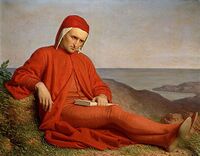
Whilst the Holy Roman Empire was on a monarch merry-go-round, the Papacy had decided to move their offices to Avignon in France on the grounds that Italy was 'just too dangerous'. This was good news for the French monarchy who now had the Papacy in their pocket and popes who were happy to condemn anything that didn't agree with France. This was proved when King Philip IV of France and with the backing of Pope Clement V and his powers of eternal damnation tried to parachute the monarch's brother Charles Duke of Valois as the next ruler in Germany. Instead the electors elected Henry Count of Luxemburg as Henry VII in 1308.
Since the pope was now in France, Henry VII decided to revive imperial power in Italy. The Italians were still divided between the 'Guelfs' (Pope Power) and the 'Ghibellines' (Imperialism Rocks). Henry naturally supported his side and conquered most of Northern Italy and the praise of Dante who equated Henry with Father Christmas as the bringer of peace and goodwill. Henry also wanted to be crowned Holy Roman Emperor and did this 1312, the first time in a 100 years there had been an imperial coronation. Clement V couldn't (or wouldn't) turn up and do the honours as he had to officially stay in France to close down the Knights Templar on the grounds of gross indecent heresy and conspiracy theories. Henry had to rustle up his own bishops to do it and received an imperial enthronement. But once again Rome's weather and the mosquito sanctuaries nearby got him on the way back to Germany.
Once again the Holy Roman Empire's electors wanted to rotate the job but ended up with a double election. The Habsburgs candidate Frederick the Handsome (i.e. his face was ravaged with the effects of disease or bad dentures) challenged for the post but lost out to a new rival dynasty, the Bavarian thigh slappers from Munich known as the Wittelsbachs. Their representative Louis (Ludwig) became Louis IV. Frederick played the sore loser and retired to Austria, claiming he was the true winner until he was tempted out of his castle by a powerfully aromatic Swiss cheese and was captured.
Louis blamed the Pope John XXII and France for messing around with his authority and supporting Frederick so to get his own back, marched to Rome. Following the example of Henry VII arranged his own coronation as Holy Roman Emperor and in example later followed by Napoleon, crowned himself to show everyone that his office was sanctified directly from God and didn't need any papal confirmation. To prove that point, Pope John was deposed for heresy and overstaying on a papal holiday in France and a new pope was selected, Antipope Nicholas V.
There was a flurry of excommunications and nasty long legal letters between a Pope and Emperor. Louis and his pope were forced to leave Rome by Guelf supporting forces. Louis then retreated to Munich where he gathered a team of religious trained lawyers to write documents with illustrations denouncing papal claims of universal power. Amongst those chipping in was the Englishman William of Occam who added his protest at papal pretentions by shaving off his beard with his own razor.
The other German princes, Louis IV seemed to becoming too powerful and as emperor, rewarding his own family with lands that had fallen vacant or where the succession was in dispute. So in 1346 the Electors met and elected Charles Count of Luxemburg (grandson of Henry VII) as Charles IV. A new civil war was in the offing but Louis died a year later. Even the papacy was behind him but they were in for a surprise.
Golden Bulls
Charles IV's reign as King of the Romans hadn't started well. Regarded by Germans as a 'French-Papal Puppet', Charles had narrowlly avoided ending up an arrow cushion when he had fought with his father King John of Bohemia against the English at Crecy. That lucky escape and Louis IV's death a year later left him undisputed. The Papacy demanded Charles reverse all of Louis's actions against the Pope, burning all the documents and if possible — all those who had supported Louis — against the Pope. Charles agreed 'in spirit' but he put this to one side as the Black Death struck Europe. Charles survived but decided to leave Luxemburg and relocate to Prague which became in effect the capital of the Holy Roman Empire.
For the first time since Frederick Barbarossa, Charles IV would in due time receive coronations for all the crowns that came bundled with the imperial title in Germany, Burgundy, Italy and Rome. Like Henry VII and Louis IV, his coronation as Holy Roman Emperor was missing a pope. Disgruntled by this shoddy reception, Charles was in and out of Rome in a couple of hours. Perhaps judging the popes and the papacy had given all emperors a hard time, Charles came up with a 'Golden Bull' to present to the Seven Electors. The pope received a tray of broken china. This meant for those who understood such symbolism that the papacy had no right to choose their own imperial candidate, blow a whistle or excommunicate in a fit of pique. The new official title was now Romany-Caravanum Sacrum De Facto (De Jure if I make to Rome without a breakdown), Secularum Canis Superior Christendom (Papa Universalis Keep Your Nose Out). Charles said 'emperor' was fine without qualification.
With that settled, Charles IV spent the rest of his time in Bohemia sponsoring the construction of a university in Prague. It was open to all students from across Europe and gained the reputation as place of hedonistic night life and water fights in the dormitories. The 'wild' reputation of Bohemia spread the image that everyone who went or came from there was a drug loving utopian. Also the beer was very good, something Charles's sons Wenceslaus (Wenzel when feeling German) and Sigismund couldn't resist. Both sons would letter gain the reputation as 'the dirtiest drunks in Europe'.
Drunks, Cheats, and Revenge on the Papacy
Charles's death saw the uncontested election of his son Wenceslaus as Emperor (See above for the full convuluted title). He was only 19, barely out of college but full aquainted with alcohol. In the tradition of German and Bohemian princes, Charles had taken the precaution of parcelling up his family territories with various members of the House of Luxemburg. So what income Wenceslaus got was promptly drunk away. He was Good King Wenceslaus when it came to the Czech brewing business and his constant red nose delighted the Bohemians.
Wenceslaus managed to stagger to his various coronations (though Burgundy refused to let him as they wanted to keep a good proportion of that year's crop). He got to Milan to receive the crown of Italy but Rome was beyond his immediate budget as he had no money to buy a cheering crowd. Also as the Papacy was split between rival Popes in Rome and in Avignon, Wenceslaus tried to get a cut price Imperial coronation somewhere. With no luck there and when his cheques in Germany bounced, Wenceslaus retreated back to Prague and spent more time in his cellar checking on his stock.
Feeling abandoned, the German Electors (minus Wenceslaus who as King of Bohemia could vote for himself) met and chose a new ruler Rupert. A member of the same family as Louis IV, Rupert was Elector of the Palatinate of the Rhine so he was able to vote for himself too. Wenceslaus couldn't be bothered to leave Bohemia and challenge his rival so it was left to his younger brother Sigismund to take up the challenge. Sigismund was already King of Hungary having married into the ruling dynasty there. Rupert discovered as others before that unless you had a private income, the job of trying to be ruler of the Holy Roman Empire was an expensive waste of money. When Rupert died, Sigismund ignored his brother and got himself elected, though only after nobbling a cousin Jobst who applied at the same time. Wenceslaus made a drunken protest but fell asleep.
Sigismund was already a monarch of a realm outside the Holy Roman Empire so his attention was always going to be divided. He also got involved in a long drawn conference in Constance to work out who was the true pope. Unable to decided between three candidates, Sigismund encouraged a council to depose the lot and select a new candidate. Recalling the humiliations Holy Roman Emperors had got from the popes for the lost four centuries, this must have been a good moment. But then, typically Sigismund lost it when his 'safe conduct' letter for the religious reformer Jan Hus Huf to discuss the state of the Catholic Church was ripped into pieces and Huf was 'hussed up like a heretic' in well stacked bonfire. This upset the Bohemians who blamed Sigismund for his worthless promises. When Wenceslaus died, the followers of Huf — the Hussites Huffites — refused to let him into Bohemia and a long war ensured, proclaimed as a 'crusade' as the Huffites were huffable heretics.
Sigismund eventually received his imperial coronation but died not long after. Like his brother he was a drinker and on a visit to England had appalled his hosts by standing in Whitehall wearing just his slipper and waving a bottle of Pilsner at Westminister Abbey. He was compared unfavourably with the Byzantine Emperor Manuel II who also visited England looking for funds and received a wagon load of foreign aid. Sigismund had been offered nothing and was told to his face his imperial title was a 'bucket of warm horse piss'.
There's Only One Family in It
Sigismund died without a male heir, indeed only one daughter Elizabeth had managed to survive her father's drunken rages. She had married Albert Habsburg who therefore also became King of Bohemia and Hungary. The Electors chose him as Albert II but he died a year later. Perhaps not wishing to upset the Habsburgs so soon, the electors chose one of Albert's cousins Frederick as the next monarch. He had a grand sounding name and looked good in a mantle.
Frederick III has to have been one of the most unsuccessful, unwarlike rulers in history. His long 'reign' saw him lose Vienna to the Hungarian king Matthias, unable to hold on to Bohemia and moving around Germany dressed as a princely vagabond, relying on hospitality to keep him going. When the Byzantine emperors made a last appeal for help from the Western Rival, Frederick sent a letter to the Ottoman leader Mehmed II. It's contents were preserved and translate that If you come within five leagues of Constantinople, I will head a crusade to chastise you wicked man. The Ottomans went on to capture Constantinople but helpfully published Frederick's pathetic letter.
In all this, Frederick did manage to make the trip to Rome for an imperial coronation, the last one as it turned out to be for any emperor from either the West or East. He also had to deal with the Dukes of Burgundy whose miscellaneous collection of territories criss-crossed the Franco-German border. Duke Charles the Bold had so much money that he said he could become the next Emperor and suggested Frederick should step down. Instead Frederick promised a crown in return for Charles's daughter Mary marrying his son Maximilian 'Max', Archduke of Austria. With the deal sealed, Frederick absconded and before Charles could track down the treacherous Frederick, he was killed and frozen meat pie for a pack of wolves. Maximilian therefore inherited the lands got via the wedding suite rather than military conquest, a policy the Habsburgs were happy to use in the future.
Emperor Elect and the Last Papal Coronation
Frederick's (lower) jut jaw son Maximilian I was elected without a problem and became emperor. Something of a roustabout in the tournaments, Maximilian had already travelled around the empire, leaving bad debts and overblown promises. His wife Mary had the good manners to drop dead early leaving Max with a young family. The Habsburgs once again got busy marrying, into the Spanish royal family and the Jagiellon dynasty in charge of Bohemia and Hungary. What the interests of the Holy Roman Empire in all this was explained but the Habsburgs had already in effect merged imperial policy with their family's interests.
This was more than enough for the Swiss who now decided to ignore all future imperial edicts about everything and barred anyone crossing their territories, especially Habsburgs. They joined the Italian in Lombardy and Tuscany who had earlier drifted away or rebelled. Other lands that had once been part of the Holy Roman Empire in Provence and Dauphine had been merged into France, the empire was definitely shrinking but these were not part of the Habsburg family lands.
Maximilian did try to get to Italy for his 'imperial cherry on the top' but got blocked by Venice who rejected Maximilian's passort. Deciding to give up on his Rome trip, Maximilian changed title to Emperor Elect, there really was no need to risk going to Italy anymore. Max had all the titles he needed.
When Maximilian finally died from some old jousting injury in 1519, his preferred heir was his grandson Ferdinand Duke of Austria. The Electors (the Seven Wise Monkeys) wanted a bit more competition this time and suggested they were willing to consider (read, take bribes from) outside candidates too. The three that put themselves forward were King Francis I of France, King Henry VIII of England and King Charles I of Spain. Henry soon dropped out and then Francis was outspent by Charles. He had not just Spain but the rapidly growing overseas empire in the Americas to fund his bid. He was also a Habsburg and the elder brother of Ferdinand. And he was ugly, inheriting the Habsburg lower jaw which stuck out far enough to collect water when it rained.
With all his power, it would be imagined that emperor Charles V would re-establish imperial power play in Germany. But he was to face a serious problem thanks to the preacher Martin Luther. The Protestant leader rejected the Pope and the Papacy and as the Emperor was supposed to be the guardian of that regime, him as well. However this part of Luther's message was quickly changed when it appeared to be upsetting the political order within the Empire. Charles V for his part was busy defending his lands from the Turks in the East and the French in the West. Nor was he choosy about who his generals recruited for his armies. Judging that Pope Clement VII was being difficult and secretly supporting France against him, Charles sent an army to Italy. The troops reached Rome but they were after pillage rather than piety, not surprising as many were already influenced by Luther's anti-papal rhetoric which referred to the 'Scarlet O'Harlot' of the Vatican. The Papal capital was stormed by the army who would stay for months, killing, raping, pillaging and leaving obscene drawins all over the Pope's private chambers (though Raphael's cartoons were dirty enough to make even a protestant blush).
Somewhat late in the day, Pope Clement asked Charles to recall his army and he would in person crown him. As Rome as a wreck, Pope Clement chose Bologna for this honour. It was a grim affair and no one felt much like celebrating but it was the last papal coronation of an emperor.
Pomp and Ceremony but No Power
Charles's later years were to see a triumph over an alliance of Protestant princes in battle. Charles thought he would be free to depose 'heretics' and take away their lands for Catholic claimants, but the French (Catholic) monarchy instead intervened in support and forced Charles to back down. He took it badly but agreed that the former religious unity (if nothing else) of the Holy Roman Empire was over. In the north and south there were separate Protestant and Catholic leagues but Charles had already decided to abdicate and spend his final years in prayers and watching his relatives fight on Jerry Springer.
The next emperors, Ferdinand I (Charles's idiot brother) and his son Maximilian II, took more interest in their growing band of lands to the East, now including Bohemia and part of Hungary. Trying to stamp out protestants in Germany seemed an uneconomical activity. The next emperor Rudolf II preferred living in Prague and working on his astrological charts. His brother Matthias didn't even have that hobby. He was replaced by his cousin, the Catholic fanatic Ferdinand II. The Bohemians who were still 'Huffies' and inclinded to Protestantism rejected Ferdinand and chose another prince as their king. He invaded and when that was successful, kept marching north and chasing protestants. The Vatican was pleased but eventually others got into the war which lasted 30 years. To be boring and not to add any sense of victory to one side or another, the war was titled Thirty Years' War. The big loser was the Holy Roman Empire again, this time the Dutch formerly tore up their imperial membership card and like the Swiss, that was too do with Habsburgs — though this time it was the Spanish branch of the family that had been the problem.
The eventual treaty that emerged was signed, licked and sealed in Westphalia. The Holy Roman Empire (now under Ferdinand II's son Ferdinand III) was still emperor but he had no formal powers over the other princes. They were in effect sovereign rulers of their own territories, belonging only to the Holy Roman Empire like inactive members of a golf club past its best. Some of the states were now becoming larger like Brandenburg-Prussia had their own ideas about what they wanted. The coronation parties were still good to meet up and extract any more concessions from the Habsburgs.
Where are the boy princes?
The end of the war within the the Holy Roman Empire left a lot of Germans with glum faces. Chief glum would be the next Holy Roman Emperor Leopold I. With no hope of Habsburg advance in the empire, Leopold had looked south east towards the Ottoman Empire. However it was the Turks who made their big move, sending an army to seize Vienna and get their hands on all the lovely strudels in 1683 . Leopold tried to rally the empire to help but everyone disappeared, claiming their grandmother/dog/house/er../ were sick and in need of immediate attention. Leopold was saved by the Poles who had their own beef with the Turks and together their armies rolled the Ottomans as far south as Belgrade. Leopold got Hungary, Croatia, Slovakia, Transylvania and since no one from Germany helped him, bugger all for the Empire. .
Though there was still no prince to challenge them for the imperial title, this time it was the Habsburgs themselves who started to run of male heirs. In 1705 Leopold's son Joseph I became emperor but his younger brother Charles was trying to regain Spain for the dynasty after the Spanish Habsburg died out from excessive in breeding. When Joseph in turn died, Charles was elected emperor as Charles VI, he was the only male Habsburg left. Spain was abandoned, the Habsburg adoptive homeland had to be protected.
Despite his best marital efforts, Charles's wife supplied him with daughters. The eldest Maria-Theresa was married Francis Duke of Quiche-Lorriane but the latter had to essentially surrender his family lands (and recipes) to the French to achieve this, arriving in Vienna in his only clean pair of knee breeches. When Charles died, the electors looked at Francis and decided he wasn't 'imperial enough' and chose instead Charles the Elector of Bavaria as Emperor Charles VII. This was an extra twist of the knife as Charles's wife, Maria Amalia, was the daughter of Emperor Joseph I.
The third Wittelsbach to go for the imperial job, Charles VII needed the support of allies to take on the Austrians. As so many emperors had realised before, the moment you got the job so did your friends turn on you and he was no exception. Since it was believed all the other German princes like Frederick the Great of Prussia were ineligible because they weren't catholic, there was no other prince who take it unless Habsburg related. Francis of Lorriane therefore became Emperor Francis I and the Habsburgs renamed officially as the Habsburg-Lorriane (the Austrians insisted the 'Quiche' it get left off the new dynastic dinner service.
Coming to the End
The first Emperor of the new double barrelled dynasty Emperor Joseph II was given the grandest of all imperial party coronations. His mother still kept the bulk of the empire under her direct control, hoping to one day get her own back on King Frederick of Prussia. However Joseph adored Prussia and the new Germanic method of governance. He wanted the Holy Roman Empire to be like that but saw this could only be that country by annexing any loose territories. When the Bavarian Wittelsbach line died out, the Palatine line were willing to sell that to Austria in exchange for become 'King of Burgundy' (i.e. Belgium and Luxemburg). Frederick objected and created an alliance to stop Joseph. It worked and Joseph spent his reign antagonising people and upsetting Mozart with his tin ear for musical composition.
Joseph also involved himself with the affairs of his brother-in-law Louis XVI and his sister Queen Marie Antoinette as a marriage guidance councellor. Whilst in France Joseph didn't seem to notice that the French were bubbling away with discontent. It was only when Joseph upset the Belgians with some of his reforms that he realised the power of popular revolt. When he died Joseph asked that his coffin be plated with a message FAIL.
His brother Leopold II briefly became emperor before his son Francis II succeeded in 1792. Another one of the ugly Habsburgs with a hang dog look, Francis II saw his armies get beaten by the French and especially when lead by ex-Gunnery officer Napoleon Bonaparte. Germany west of the Rhine was lost, Belgium and in Italy where the Habsburgs had inherited some of their Spanish cousin's former territories.
Napoleon was meantime running the French constitutional clock on very fast forward and within a few years turned France from a Republic, a Directory, an ex-Directory, a Consulate before settling on that of 'emperor'. Napoleon proclaimed himself 'Emperor of the French' and in December 1804 dragged Pope Pius VII to Paris to bless his coronation. Like previous Holy Roman Emperors, Napoleon rudely snatched the crown from Pius's hands and crowned himself as Emperor. A clear message, I did this all on my own'.
For the first time there were now two Emperors in Western Europe. One who was 'Emperor of the French' but of a country that included a lot of people who were certainly not French at all. The other was still 'Roman Emperor', holding the rights (at least claimed) of the Caesars from Ancient Rome, Constantine the Great, Charlemagne and Otto the Great. For Napoleon this one emperor too many.
Seeing that Napoleon could easily demolish the rest of the Holy Roman Empire — and in the process, deprive the Habsburgs of their prestigious title — Francis added 'Emperor of Austria' to his titles. Since Austria was still inside the Holy Roman Empire it meant he was emperor twice over for many of the same territories! Perhaps not surprising, Francis's post started to go missing.
This farce of three empires and two emperors ended when Napoleon sent a message to Francis which through the various crossings out spelt out the message that if the Austrian didn't give up his 'universal title', Napoleon would come down to Vienna and kick him all around the Ringstrasse. The threat worked, Francis 'resigned' in 1806 but kept all the imperial regalia and pawn tickets. Napoleon as the new Charlemagne was happy with that and predicted in future that French was the new Latin. It was the long belated French revenge for letting the Germans reviving the title back in in 962. Balls to Otto the Great.
Conclusion
Francis didn't go fighting like the Last Byzantine Emperor. He simply burnt his stack of Holy Roman Empire writing paper, closed the door and retired to the Hofburg Palace in Vienna. The line that had started with Augustus had feebly limped off the stage[10]. The charade was over, shame Voltaire wasn't there to write the final obituary.
References
- ↑ Belgium, Netherlands and the mighty Grand Duchy of Radio Luxembourg
- ↑ They were 'King of Germany' or 'King of the Romans' without this trip to see the pope but that put them on the same level as the rulers of France and England
- ↑ Charles the Bald in dull history lessons.
- ↑ This era in Church history is called the Pornocracy. Ask a Catholic priest about that
- ↑ On penalties, what else?
- ↑ In attempt to get better credit ratings, the Magyars became Hungarians
- ↑ This is the pre-insurance age.
- ↑ ..'barbarians in ghastly clothes' according to the Patriarch of Constantinople.
- ↑ The Worms Diet came 500 years later.
- ↑ In 1999, a character called Karl Friedrich of Germany claimed he had been elected 'Emperor Charles VIII'. In a London pub. It was his round, apparently. See David Icke for more genuine lunacy.
See also
| Featured version: 7 November 2015 | |
| This article has been featured on the main page. — You can vote for or nominate your favourite articles at Uncyclopedia:VFH. | |
